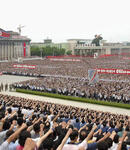

Researchers

Rapidly changing circumstances continue to shape relations on the Korean peninsula and in East Asia. North Korea has repeatedly engaged in provocative behavior, and the constant flux of political, social, and economic affairs in the region has also created challenges for long-standing alliances.
This research project seeks to examine the interests and policy environments of South Korea, North Korea, and their neighbors. Issues addressed will include the role of North Korea, nuclear proliferation, Japan’s economic future, the rise of China, and Korean reunification.
Project investigators seek to understand the future domestic and global implications of North Korea’s political situation and social conditions. As part of America’s rebalancing efforts in Asia, the United States and South Korea must also adapt and strengthen their alliance. Security, trade, and the environment, among other issues, are shared concerns on which the two countries can cooperate.
This initiative stems from the annual Koret Conference that first convened in 2009. Operating as a policy workshop, the conference brings leading scholars and professionals from Asia and across the United States to Stanford to discuss contemporary Korean affairs.
Publications stemming from the project include a book that Gi-Wook Shin and David Straub co-edited with Choe Sang-Hun, then a Korean studies visiting fellow at Stanford and Pulitzer Prize-winning New York Times reporter, entitled Troubled Transition: North Korea’s Politics, Economy, and External Relations (Shorenstein APARC, 2013), an APARC policy brief, “The North Korea Problem and the Necessity for South Korean Leadership,” and a policy recommendation, “Tailored Engagement: Toward an Effective and Sustainable Inter-Korean Relations Policy” (Shorenstein APARC, 2014), written by Gi-Wook Shin, David Straub, and Joyce Lee, which was also translated and published in Korea.
With the recent changes of leadership in both Seoul and Washington, the U.S.-ROK alliance is facing new challenges in coordinating a North Korea policy that is agreeable to both countries and to the alliance. U.S.-DPRK relations have become dangerously unstable, with the risk of military conflict. This project seeks to address the growing crisis, to reduce the risk of conflict now while fostering inter-Korean reconciliation to promote eventual re-engagement of the North by involved countries, but especially South Korea.
